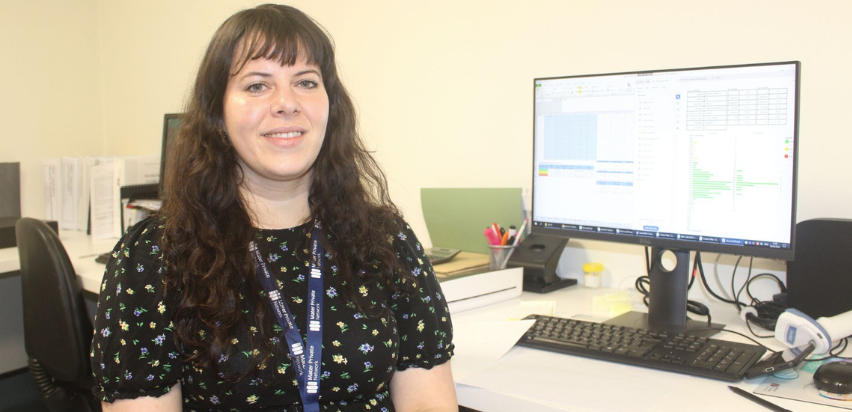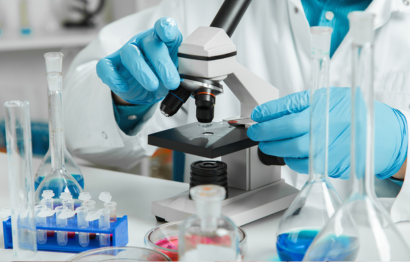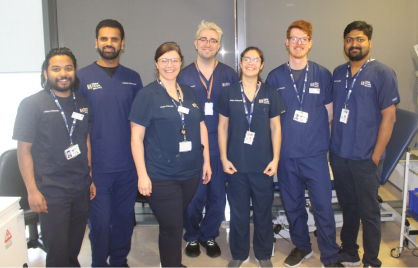7th May 2024
Meet The Team - Medical Scientists
Our team of medical scientists are essential for effective testing and reporting of results for patients across our network. For example, if you provide a blood sample during your appointment in Mater Private Network, our medical scientists will analyse the sample and report its findings back to your care team.
We recently met with our Medical Science team in Mater Private Network Cork to understand more about their job and how important their role is in the diagnostic process for patients.

Maite Devos Lozano - Medical Scientist at Mater Private Network Cork
Maite Devos Lozano is a Medical Scientist at Mater Private Network Cork. Maite has always been fascinated by how the human body works and how one change in the body can have a knock-on effect on our overall health. This interest led Maite to her current career path. She underwent five years of intense study and practical experience before she secured her current role.
She works in a multi-disciplinary laboratory which means the laboratory team is trained to work across four disciplines – microbiology, haematology, biochemistry, and blood transfusion. In microbiology we test for bacteria and viruses which cause infections like Covid-19. In haematology, we check that blood is clotting properly to prevent bleeding. In biochemistry, we test for hormones and proteins in blood which indicate how organs like the kidneys and liver are working. In blood transfusion, we test patients’ blood group to ensure blood given to patients is suitable.
.jpg?sfvrsn=b2b55c8c_1)
Pathology Laboratories
Mater Private Network's laboratories provide healthcare professionals with information to diagnose, manage and monitor their patients’ conditions.
Learn more
Could you please walk us through a typical day in your role?
When we come into the laboratory every morning, the first thing we look at is what department we are assigned to for the day. If I am assigned to haematology or biochemistry, I begin by preparing the haematology or biochemistry instruments, so they are ready to test patient samples. Once this is complete, I will run control samples. Control results should be within specific ranges. This process indicates whether the instrument is working correctly.
We receive samples from different departments across the hospital. We review test and patient details on the samples and then run the tests requested by the clinical teams. When testing is complete, the results are transmitted from the testing instrument onto the laboratory IT system where we check and interpret the results, compare the results to the patient’s clinical history, and assess whether further testing is required.
If a test result is critical or relates to an urgent situation, we call the care team involved. For example, if cardiac markers are high for a patient and it is unusual, they need to know as soon as possible. In this situation we would call the senior nurse on the patient’s ward to inform them that there is a critical result for this patient. These laboratory results contribute to understanding the overall picture for patients. They also assist the clinical team to know how to move forward.
.jpg?sfvrsn=5ae7b862_1)
The laboratory consults with many other teams in the hospital. If, for instance, a patient tests positive for Influenza, we will inform the infection control team who will advise the patient and staff to use precautions to stop the spread of influenza to other patients, visitors, or staff.
There is a lot of variety in our work. One of the additional tasks I have responsibility for is external quality assessment (EQA) for the laboratory. These assessments test the performance of our medical scientists, instruments and the laboratory. If we get the correct result, we know we can trust our process and our test values, and this also helps to ensure patient safety. I review the reports from this process and the statistics behind them. If the performance of any of these EQA samples is declining or degrading over time, I bring this to the attention of the senior scientists in the laboratory and together we look at what the issues are and how to proceed. Sometimes we may need to contact engineers that oversee the instruments for their advice and expertise, as well as discussing it with consultants overseeing the laboratory.
Doctors may recognise specific signs or symptoms in a patient from speaking to them and studying how their body is behaving as well as looking at their clinical history. As medical scientists, what we provide is another piece of the puzzle for clinical teams to assess patients, to help in the diagnosis of specific illnesses or infections, or to rule out other illnesses.










.png?sfvrsn=51183b38_1)


.jpg?sfvrsn=5a81ae69_1)